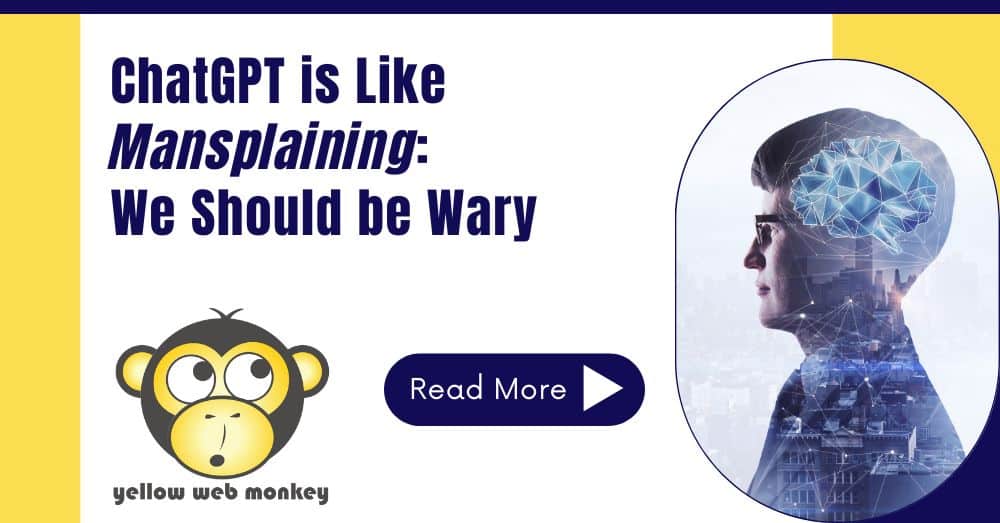The annoying coworker three cubicles down is speaking louder than necessary. He’s recapping the weekend’s news as if everyone else lives in a hole…without instant access to all information at all times.
Now, he’s making his way to you to clarify the new office software—as if you didn’t attend the training.
You didn’t ask for an explanation. You didn’t ask for help or advice. But, perhaps more importantly—why does he assume you need it?
The phenomenon of mansplaining is nothing new (and while it’s uniquely male, we acknowledge that both men and women are capable of condescension).
Mansplaining: to explain something to a woman in a condescending way that assumes she has no knowledge about the topic—Merriam-Webster Dictionary
The great thing is society is starting to acknowledge that it isn’t helpful or necessary: and in the same vein exists ChatGPT.
ChatGPT is the flashy new tech making its rounds and infiltrating everyone’s newsfeeds, desktops, and water cooler conversations.
Yet despite its ground-breaking AI capabilities, it’s a lot like mansplaining: its assets aren’t always as advantageous as advertised.
And it’s trying really hard to impress us.
ChatGPT Undermines Our Intellect
We’re often tempted to accommodate so-called technological “advances” that are more negative than helpful. Like social media: we sign on to stay connected, only to be fed advertisements and hear that everyone else’s life is better than our own.
It’s best when we control the narrative and aren’t told what to think and feel.
Like the boastful coworker, ChatGPT may be trying to come across as a dominant advancement.
In reality, it has a number of major flaws. And it might be better not to encourage it.
ChatGPT Content Can Be Outdated, Incorrect…and Infringe on Privacy
ChatGPT is an AI encyclopedia built from pre-published, online content.
But like a lot of online content, it isn’t necessarily vetted. It’s become yet another platform for disinformation and misinformation to run rampant.
When directly asked about promoting disinformation, ChatGPT replied:
I was trained on a diverse range of internet text, which includes a mix of truthful and misleading information. My responses are generated based on patterns in the data I was trained on, so it’s possible that I may generate information that is incorrect or outdated.
At least ChatGPT is willing to admit it can perpetuate falsehoods…until it comes to data privacy.
An article from Tech Xplore states, “OpenAI, the company behind ChatGPT, fed the tool some 300 billion words systematically scraped from the internet: books, articles, websites and posts—including personal information obtained without consent.”
And beyond an uninvited breach into our personal lives, ChatGPT lacks recent, more pertinent guidance.
If you ask it who won the Super Bowl, it will reference Super Bowl LV and the Buccaneers. If you ask it to write an essay on the effect of Queen Elizabeth II’s death on Great Britain, it won’t know she’s deceased.
That’s because ChatGPT hasn’t been updated since 2021. It’s only as good as its most recent download.
Like the clueless mansplainer, it can feel out of touch with reality.
Chat GPT’s Artificial Intelligence Lacks Intuition
Remember Good Will Hunting? The movie that won Robin Williams his one and only Oscar, and made Matt Damon and Ben Affleck famous?
In the story, Matt Damon (Will) is a genius. But the intelligence he spurts out is more akin to bookish word vomit than authentic, real-life experience.
Robin Williams poignantly points out this major flaw:
“You’re an orphan, right? Do you think I’d know the first thing about how hard your life has been, how you feel, who you are because I read Oliver Twist? Does that encapsulate you?”
“If I asked you about art, you’d probably give me the skinny on every art book ever written…But I’ll bet you can’t tell me what it smells like in the Sistine Chapel.”
“I’d ask you about love and you’d probably quote me a sonnet. But you’ve never looked at a woman and been totally vulnerable, known someone that could level you with her eyes.”
Touché, Robin. (Note that he makes his point about mansplaining without mansplaining.)
Yes, some aspects of Chat GPT may be ground-breaking—even genius. It’s true it can immediately pen a love letter or a poem about cherry blossoms swaying in the breeze. In seconds, it will produce a detailed thank you note to a client in Shakespearean prose.
But AI hasn’t seen the cherry blossoms delicately grace the shoulders of someone it loves and simultaneously felt the warm spring sun’s rays beating down on its skin. And that context matters: not only for the sake of authenticity, but for depth.
We don’t need computer-generated content to mansplain (or techsplain) beauty to us in poems void of emotional sincerity. And we don’t want workers—or students—sourcing content from a program rather than real-world, personalized perspectives.
“Mansplaining may seem like a trivial issue in isolation, but how we communicate tells other people how much or little they are valued.” — BBC.com
AI doesn’t understand us or know us. So its propensity to explain feels patronizing.
ChatGPT Can Stifle, Rather Than Enhance, Creativity
ChatGPT was created by intelligent (human) design to immediately regurgitate information in a coherent fashion.
But it’s incapable of creating an original thought. And relying on it feels more like an intellectual downgrade.
Tech should be a conduit to facilitate more progress—not a crutch to use our imaginations less. But when you ask it to write your spouse a love letter, ChatGPT sounds like a canned Hallmark card:
You are my rock, my best friend, and my soulmate. You always know how to make me laugh, even on the toughest days. You are there for me through thick and thin and I am so grateful for your love and support.
Regardless of AI’s many advantages, the sole idea of anyone or anything dictating thoughtfulness—as opposed to encouraging it—is risky.
“Some experts believe ChatGPT is a tipping point for AI—a realization of technological development that can revolutionize the way we work, learn, write and even think. Its potential benefits notwithstanding, we must remember OpenAI is a private, for-profit company whose interests and commercial imperatives do not necessarily align with greater societal needs.” — Tech Xplore
Mansplaining has a similar tendency to focus on itself and its needs, including validation, success, and dominance.
In countless sci-fi movies, robots convince themselves of their superiority and man’s mediocrity. They lack respect for emotional intelligence—that sincere, innovation-driving quality that makes us distinctly human.
But this is, in fact, what also makes us truly brilliant.
Sure, we can use ChatGPT for a laugh now and again or a quick recap of that season finale.
But like mansplaining, let’s keep it in check.





